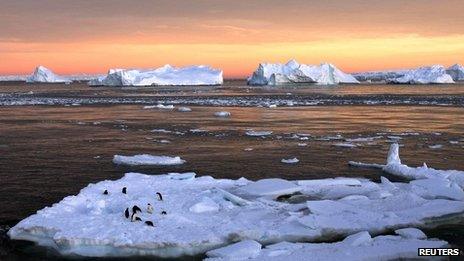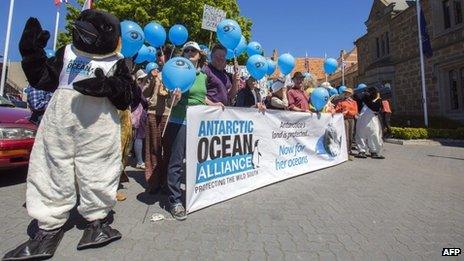Antarctic marine reserves: Russia and China block plans
- Published

Adelie penguins on an ice floe in East Antarctica, where proposals for a sanctuary were rejected
Plans to create two huge marine sanctuaries in Antarctica have failed for a third time, after Russia again headed nations which blocked the bids.
The meeting of the Commission for the Conservation of Antarctic Marine Living Resources in Australia had sought to protect the Ross Sea and an area off East Antarctica from exploitation.
But delegates from 24 countries, plus the EU, failed to reach a consensus.
Environmental groups called it called it a "dark day" for the Antarctic.
The Commission for the Conservation of Antarctic Marine Living Resources (CCAMLR) is made up of countries with an interest in Antarctica.
The continent and its waters are home to more than 10,000 species, including most of the world's seabirds, penguins and whales.
CCAMLR includes Australia, the US, China and Russia, and the European Union among its members. Any decisions taken require consensus among all parties.
Plans for a marine reserve in the Ross Sea - a deep bay on the Pacific Ocean side of the Antarctic - have been under discussion for a decade, and have been blocked on several previous occasions, with the main sticking point restrictions on fishing.
According to the environmental advocacy group, Antarctic and Southern Ocean Coalition, the Ross Sea comprises 3.3% of the area of the Southern Ocean, but "it provides habitat for significant populations of many animals, including 38% of the world's Adelie penguins, 26% of Emperor penguins, more than 30% of Antarctic petrels, 6% of Antarctic minke whales, and perhaps more than 30% of 'Ross Sea' killer whales".
Hope for agreement
"Moreover, it has the richest diversity of fishes in the high latitude Southern Ocean, including seven species found nowhere else."
A revised proposal by the US and New Zealand - reducing the scale of the Ross Sea reserve by 40% to about 1.25m sq km (482,000 sq miles) - had been thought more likely to succeed at the Commission's meeting in Hobart.
Also on the table in Hobart was a proposal to create a protected zone of 1.6m sq km (618,000 sq miles) off East Antarctica.

The Antarctic Ocean Alliance, which rallied outside the CCAMLR meeting in Hobart, said "countries led by Russia wanted to wreck the agreement"
The two zones were intended to conserve parts of the Southern Ocean from fishing, oil exploration and other commercial exploitation.
But they were both blocked by Russia and Ukraine, while China withdrew support for the East Antarctica proposal.
"It seems pretty clear that a small group of countries led by Russia wanted to wreck the agreement," said Steve Campbell, director of the Antarctic Ocean Alliance which campaigns for protecting the Antarctic seas.
Andrea Kavanagh, director of The Pew Charitable Trusts' Southern Ocean sanctuaries project, also expressed dismay at the outcome:
"This is a dark day not just for the Antarctic, but for the world's oceans," she said.
"Protecting the Southern Ocean has far-reaching consequences for the world's oceans and all those who rely on them for food, jobs, and a multitude of other services.
"Three-quarters of all marine life is maintained by a Southern Ocean current that pulls nutrient-rich waters from the deep ocean to the surface and then around the world.
There was no immediate statement from Russia.
Environmentalist say they hope agreement on the marine protected areas can be reached by CCAMLR next year.
- Published16 October 2013
- Published14 August 2013
- Published16 July 2013
- Published8 July 2013